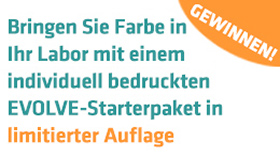Interview with Ernst-Ludwig Winnacker
From National via European to Global Responsibilities!
Interview: Interview: Ralf Schreck Labtimes 06/2015
The 74-year old Ernst-Ludwig Winnacker has had many jobs throughout his career, both in academia as well as policy-making. Recently, he retired from his post at the Human Frontier Science Program Organization (HFSPO), freeing up time to go back to the lab, reflect about the state of European science and play piano.
The promotion of young scientists has always been a key objective for Ernst-Ludwig Winnacker. The German studied chemistry at the ETH Zurich and later turned into a molecular biologist with an interest in DNA recombination, gene expression and host-virus interactions during his postdoctorates at the University of California, Berkeley, and the Karolinska Institute at Stockholm. The Institute of Genetics in Cologne and the Institute of Biochemistry of the Ludwig Maximilian University in Munich were further stations in his academic career.
Besides being member of high profile advisory boards and panels, he held several major policy-making positions, for example, as Vice President and President of the German Research Foundation (DFG), first Secretary General of the European Research Council (ERC) or Secretary General of the Human Frontier Science Program Organization (HFSPO). Between 1984 and 1997 he established and headed the Munich Gene Center, one of the first German institutions to foster early scientific independence. During his presidency at the DFG, the German Excellence Initiative with the goal to promote top-level research and to create favourable conditions for young scholars at universities was launched.
Ernst-Ludwig Winnacker received numerous honours and awards for his achievements. Lab Times talked to him about his career and latest developments in the research landscape.
Lab Times: Earlier this year, you were succeeded by the Australian, Warwick Anderson, as Secretary General of the Human Frontier Science Program Organization (HFSPO). Do you enjoy your retirement or do you plan new activities?
Winnacker: I do not know your definition of “retirement” but I do not see myself in a state of dolce-far-niente as yet. I have been given an office at my “old” institute, the Munich Gene Center, and prepare for a grant application in order to be able to go back to scientific work. This should be lots of fun. I have also found a piano teacher and have just had my first lessons after 53 years or so. At the moment I practice Mendelssohn’s “Lieder ohne Worte”, op. 19, some Tschaikowsky Nocturnes, op. 19 as well, and Bach’s Italian Concerto. I do not cherish any illusions about getting back the dexterity, which I had more than 50 years ago but, at least, it permits me to make good use of my 1957 Baby-Steinway.
What is, in your opinion, special about HFSP and what contributes to its high reputation?
Winnacker: HFSP is focusing on “complex mechanisms of living organisms”, which permits it to act right at the centre of today’s excitement in the natural sciences, an extremely farsighted choice by the “fathers and mothers” of the programme 25 years ago, in particular the former Japanese Prime Minister Nakasone. In addition, its reputation derives from a rigorous and fair selection mechanism, which doesn’t have to be considerate of anything else than scientific excellence. The office imposes little, if any, bureaucracy and thus can be extremely respectful to the scientific community.
During your six-year post at HFSP what have been major challenges and achievements?
Winnacker: My major challenge was to secure the necessary funding in times of the 2008 financial crisis. It has to be kept in mind that HFSP is not an international organisation in a formal sense but just an informal union of interested parties. Its legal status is that of a Strasbourg tennis or bowling club. This means that none of the 15 members is in any way obliged to provide the necessary funding. Somehow, however, it was possible for HFSP to prevail, even in the worst of times, since its reputation is too high to fail. Even though, implementation of the necessary power of persuasion required considerable skills, efforts and attention.
What are the critical next steps for the further advancement of the HFSP funding programmes?
Winnacker: Things change rapidly. But at the time of my departure towards the end of June 2015, there were three major challenges: another round of financing for HFSP, the membership issue, and the question of trying to attract and raise private funds. Hopefully, the next Intergovernmental Conference in 2016 will manage to increase funding significantly, in order to increase grant size. The membership issue relates to two potential new members, Israel and the People’s Republic of China. Their scientific communities profit considerably from HFSP although they are not members. This raises the question of how long the current members will accept the ongoing open policies, according to which any scientists in the world can apply to HFSP. Finally, a public-private partnership has never been organised by HFSP but could be extremely helpful in the current financial squeeze.
You wrote a book entitled “Awakening of Europe’s Research – Adventures in the Brussels Bureaucracy” in 2012. In focus were your experiences during your 30-month appointment as Secretary General of the European Research Council (ERC) between 2007 and 2009. What about the feedback on your book?
Winnacker: Well, the book only appeared in German, although I have distributed an English version to various friends and colleagues. I refrained from publishing the English version because I did not want to harm the ERC. The difficulties in setting it up were enormous and writing about them would have only confirmed all the prejudices, which people have against the European Commission. At least, this is what I thought and continue to think. It must also be said that notwithstanding all the original animosity there are people in the Commission, including the current Director-General, without whose unflinching support the ERC would never have floated.
The establishment of the ERC might be seen as a difficult birth. What did make it so difficult? What was your motivation in the process?
Winnacker: Powerful sources within the European Commission simply did not like it. They could not accept the power of the ERC’s Scientific Council, which was probably the first and only institution ever, with which it had to share responsibility and influence. I must admit that I did not expect or foresee the problems. But thanks to the support of the Scientific Council, which at that time was extremely competent, experienced and cooperative, as well as the scientific community as such, many of the problems could be overcome. We were all motivated by the urgent need to establish such a funding instrument based only on scientific excellence. To fail was no alternative, although lots of people had predicted it to be a flop.
In the meantime, the European Research Council and its funding lines have turned into a major success story of the European Framework Programmes. Did you expect this development? What were your dreams and nightmares in the early beginnings?
Winnacker: My dream was to establish a European-wide funding agency, which would support scientific excellence independent of nationality and borders. The European Research Area, as it was defined in early 2000, was an extremely farsighted vision completely in line with the creation of a common currency or the absence of borders (Schengen). Today, the situation appears quite different. There appears to be more money in Europe now for fences than for migrants. We shall see how this development affects other boundaryless institutions like the ERC.
Do you follow the latest developments at the ERC? Do you always keep a close eye on your past appointments and the built-up networks or do you prefer to focus on your next challenge?
Winnacker: I rather prefer to look onto future challenges. Thus I do not know details of the current challenges of the ERC. Nevertheless, I feel confident about its future. The current leadership does an excellent job in difficult times again; this time the refugee crisis, which is costly, complex and difficult.
What are your suggestions for the next steps of the ERC from the distance?
Winnacker: The biggest challenge for the ERC is the continuing failure of scientists from the accession countries. No doubt, intelligence and talent are distributed evenly around our continent. But there is such a lack of infrastructure in the accession countries that many junior and senior scientists from these countries prefer to work in the old EU-15. I would probably act similarly if I was 35 years old. How to solve this problem? One way could be to redirect EU-structural funds into building scientific infrastructure, beginning with schools, colleges, universities and thereby preparing them for the kind of internationality and interdisciplinarity, which modern science requires. The goal must not only be to attract citizens from these countries to return to their country of origin, but also to make the institutions in these member states attractive to foreigners. The European Research Area should not consist of one-way streets only.
The German Excellence Initiative running in two phases between 2006 and 2017 has received funds amounting to about €4.6 billion. During your service as President of the German Research Foundation the Excellence Initiative has been launched. Did it fulfill its expectations?
Winnacker: I think, it did. More than that. It shook up the entire academic system and permitted scientific excellence to flourish as never before. I am surprised that it takes so long to decide about its continuation. This hesitation of the Federal and the Länder [federal states] ministries is extremely disturbing since it creates uncertainty, which induces some of the best scientists to leave the universities in Germany and to choose positions outside of the country.
What is your past and current opinion on the aspiration and reality of the three funding lines Graduate Schools, Clusters of Excellence and Institutional Strategies?
Winnacker: While I feel that Graduate Schools and Clusters of Excellence deserve to be continued, most institutional strategies have been tried in the past rounds of applications. Thus, I support the idea, to give those with best Clusters and Graduate Schools a bonus of more overhead.
The German Excellence Initiative will be continued beyond 2017. The exact format and funding measures are still under discussion. Do you have an insight into similar programmes in other countries? What lessons could be learned for Germany?
Winnacker: I think that most everybody else has learned from Germany, for a change. Most people I talk to are surprised that it takes so long to decide about the continuation of something, which is admired and has been so successful.
The promotion and early independence of young scientists has always been a focus in your career. If you look back – what have been the major changes and achievements over the last 20 years?
Winnacker: Let’s say, 30 years, since junior investigators were already a central pillar of our first application as a Gene Center in 1984. In the meantime, many organisations have developed funding schemes for junior investigators, including the ERC. It is widely recognised that the strength of any research system is dependent on early independence of qualified researchers.
There are many postdoctoral fellowship programmes including EMBO Long-Term Fellowships, HFSP postdoctoral fellowships and others with high reputations in place for a long time. What opportunities do you see for continued improvement? What are, in your opinion, problems that need to be tackled?
Winnacker: The main remaining problems are mentoring and proper career perspectives. Mentoring means that junior scientists are not left alone but supported by the senior staff in their host institute. They do not need to be told what kind of science they should do, but they need advice on many other aspects, like where to publish, which meetings to go to, how to run a group of young researchers, how to select graduate students and postdocs. This is often missing.
The other big problem is career perspectives. The concept of tenure track does exist here and there in the German academic system, but it is rare and seen as an exception rather than a rule, i.e. a “normal” career step. Even if there are tenure track possibilities, the term for a junior research group leader should not be too short. Five plus two plus two years seems to be a reasonable compromise but five years plus one, like in the Emmy-Noether concept of the DFG, is simply too short. Connected is the issue of an old-fashioned chair system (Lehrstuhlsystem). We simply have too few professorial positions in this country because they are connected to too many lower-ranked academic positions, laboratory assistants and to infrastructure. Here, we could learn from academic systems in the English-speaking world.
I continue to be concerned about the gender issue. Women are still neglected in our research system, at least on any of the advanced levels. It is hard to understand why it takes so long for people to realise that the intellect of women adds enormously to scientific quality.
Looking back to your career – how did you make the transition from a scientist into science policy making?
Winnacker: I am a fan of the university as an institution of learning and of practising research. This quality was lost in the 1980s. At least it became apparent to me at this time that we need improved academic structures and career perspectives. Structures at the time did not honour interdisciplinarity, internationality and early scientific independence. With the foundation of the Gene Center I tried to change all this. It worked. Whether these efforts can be sustained is another question. Others have copied our model but the imponderabilities of our federal system and the inertia it can create seem to threaten it. I am shocked when I hear people talk about “excellence on a broad level” (Exzellenz in der Breite). We seem to accept excellence in sports and in music but do not understand that the performance of science requires rare talents as well. People know about Nobel Prizes but whether they understand that intellectual achievements on this level require as much talent, diligence and zeal as a world class shot-putter or a piano player of the standards of Franz Liszt or Lang Lang is doubtful.
You have always been into writing about different topics and for various target groups. Examples include scientific textbooks, such as “From Genes to Clones” as well as publications dealing with the ethical implications of novel technologies, such as genetic engineering or stem cell research and for the public understanding of science. What has been your motivation and how did you find the time to write during your demanding posts?
Winnacker: Days are long. Sleep is necessary but six hours should be and are enough. This probably is true only if you do something interesting. We are lucky to live in a time when the scientific enterprise faces enormous challenges which are worthwhile to understand and to accept. You do not get tired from trying to answer inspiring questions. Another driving force is the need to communicate scientific progress to the public-at-large. My books have not become bestsellers, although “From Genes to Clones” was in high demand at its time. In fact, I am being asked all the time to prepare a new addition, since students and postdocs want to know about the scientific background of their daily work.
Mr Winnacker, thank you very much for your time.
Last Changed: 04.12.2015







